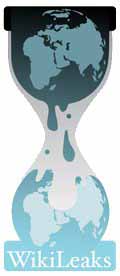Stefan Mey, a German student in Berlin, who publishes the Medien-Ökonomie-Blog writes:
I'd like to show you an interview with Julian Assange, the spokesperson of
Wikileaks, on my students' blog. On the Chaos Communication Congress in
Berlin, a hacker event, I had the chance to talk with him, about the economic and financial aspects of the website (at the moment it is shut down in order to generate money) and about the relationship of Wikileaks and mainstream media.It was planned as a very small interview of only some minutes, about the
media economy of a non-commercial web project, but then we talked for nearly
an hour and he talked about some really new aspects of Wikileaks.
Leak-o-nomy: The Economy of Wikileaks
[...]
How big is the core team of WikiLeaks?
There is probably five people that do it 24 hours a day. And then it's 800 people who do it sometimes over a year. And in between there is a spectrum.
How do you and the other four guys who work full time without getting paid finance your flat and your bread?
I made money in the internet. So I have enough money to do that, but also not forever. And the other four guys, in the moment they are also able to self-finance.
[...]
So in the moment the labour costs are still hypothetical, but the big costs that you really have to pay bills for are servers, office, etc.?
The bandwidth side, the backing is costly as well when we get big spikes. Then there are registrations, bureaucracy, dealing with bank accounts and this sort of stuff. Because we are not in one location, it doesn't make sense for us to have headquarters. People have their own offices across the world.
What about cost for lawsuits?
We don't have to pay for our lawyer's time. Hundred of thousands or millions dollars worth of lawyer time are being donated. But we still have to pay things like photocopying and court filing. And so far we have never lost a case, there were no penalties or compensations to pay.
So all in all, can you give figures about how much money Wikileaks needs in one year?
Probably 200.000, that's with everyone paying themselves. But there are people who can't afford to continue being involved fulltime unless they are paid. For that I would say maybe it's 600.000 a year.
See our previous blog article WikiLeakS.org applies for $532,000 funding from the Knight Foundation - for "local news" whistleblower leaks ?
Now let's talk about your revenues, your only visible revenue stream is donations ...
Private donations. We refuse government and corporate donations. In the moment most of the money comes from the journalists, the lawyers or the technologists who are personally involved. Only about ten percent are from online donations. But that might increase.
At the bottom of the site is a list of your "steadfast supporters", media organisations and companies like AP, Los Angeles Times or The National Newspaper Association. What do they do for you?
They give their lawyers, not cash.
[...]
You need to motivate two groups of people, in order to make the site running, the whistleblowers and the journalists. What are the motivations for whistleblowers?
Usually they are incensed morally by something. Very rarely actually they want revenge or just to embarrass some organisation. So that's their incentive, to satisfy this feeling. Actually we would have no problem giving sources cash. We don't do that, but for me there is no reason why only the lawyers and the journalists should be compensated for their effort. Somebody is taking the risk to do something and this will end up benefiting the public.
But then the legal problem would become much bigger.
Yes, but we're not concerned about that. We could do these transfer payments to a jurisdiction like Belgium which says, that the authorities are not to use any means to determine the connection between the journalist and their source. And this would include the banking system.
Exactly how strong is this legal protection in Belgium, against the revelation of whistleblower sources through the tracking of financial payments, in practice ?
If they cite "national security" or "terrorism" or "serious organised crime" etc investigations, then the US and EU governments seem to be able to legally snoop on the >Society for Worldwide Interbank Financial Telecommunication (SWIFT) international banking money transfer system, which is also legally based in Belgium
On the other side you experiment with incentives for journalists. This sounds weird in the beginning. Why do you have to give them additional incentives so they use material you offer them for free?
It's not that easy. Information has value, generally in proportion to the supply of this information being restricted. Once everyone has the information, another copy of the information has no value.
"Information wants to be free" meets the fundamental economic law of supply and demand.
In Germany you made an exclusivity deal with two media companies, the Stern and Heise. Are you satisfied with these kind of deals?
We did this in other countries before. Generally we have been satisfied. The problem is it takes too much time to manage. To make a contract, and to determine who should have the exclusivity. Someone can say, oh, we will do a good story. We are going to maximize the political impact. And then they won't do it. How do we measure this?
According to this WikiLeak.org blog comment , seemingly by Julian Assange, they have not done so with The Guardian newspaper in the United Kingdom.
This raises the question about the cases,like The Guardian's reporting of the Trafigura / Carter-Ruck "secret super injunction", where our impression is that WikiLeakS.org appear to be getting their whistleblower leaks from mainstream media journalists themselves, either unofficially, or with the management turning a blind eye.
[...]
What happened?
This auction proved to be a logistical nightmare. Media organisations wanted access to the material before they went to auction. So we would get them to sign non-disclosure agreements, chop up the material and release just every second page or every second sentence.That was too distracting to all the normal work we were doing, so that we said, forget it, we can't do that. We just released the material as normal. And that's precisely what happened: No one wrote anything at all about those 7.000 Emails. Even though 15 stories had appeared about the fact that we were holding the auction.
It sounds as if nobody trusts anyone else in this media auction.
Perhaps the University of Cambridge's cryptographic protocol thought experiment by Frank Stajano and Ross Anderson, the Cocaine Auction Protocol (.pdf) , might help ?
The experiment failed.
The experiment didn't fail, the experiment taught us about what the burdens were. We would actually need a team of five or six people whose job was just to arrange these auctions.
You plan to continue the auction idea in the future ...
We plan to continue it, but we know it will take more resources. But if we pursue that we will not do that for single documents. Instead we will do a subscription. This would be much simpler. We would only have the overhead of doing the auction stuff every three months or six months, not for every document.
So the exclusivity of the story will run out after three months?
No, there will be exclusivity in terms of different time windows in access to the material. As an example: there will be an auction for North America. And you will be ranked in the auction. The media organisation who bids most in the auction, would get access to it first, the one who bids second will get access to it second and so on. Media organisations would have a subscription to Wikileaks.
We would be interested to hear from media lawyers about whether or not mainstream media organisations really are in a legal position to sign exclusivity subscription deals with WikiLeakS.org.















I find it interesting that there is no public information available about Wikileaks themselves or the non-profit behind them, Sunshine Press. As they are asking for money from the public, they need to make more information available to the public, i.e. where that money goes, how they are structured, who gets paid for what and what the plans, short and long term are. It's hard to contribute into a void. Maybe it's a great money-making scam for someone (not suggesting it is, but who knows?).
It is ironic that an organisation that is dedicated to revealing the inner secrets of others does not reveal its own inner secrets - or even any fundamental information.
@ Ivan - we asked those questions of WikiLeakS.org when they first launched, to no avail.
Ironically, what they actually need is the services of a private Swiss Bank / Tax Haven etc. to protect the anonymity of their financial supporters, but that seems unlikely, given the Bank Julius Baer and other legal censorship affairs and the political biases of some of their core activists.